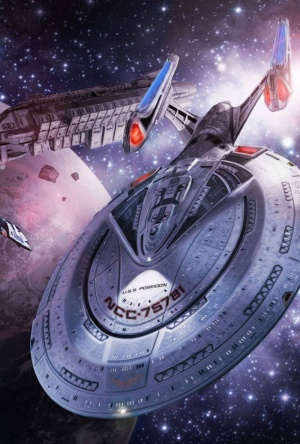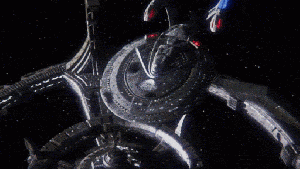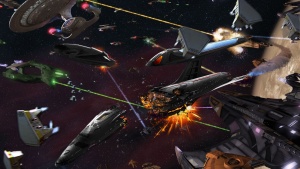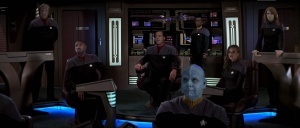USS Poseidon
From Star Trek: Theurgy Wiki

| |
| Vessel Name: | USS Poseidon |
| Registry: | NCC-75781 |
| Starship Class: | Sovereign-class |
| Starship Type: | Heavy Cruiser / Assault Cruiser |
| Status: | Destroyed / Scrapped |
| Purpose: | Exploration |
| Constructed: | San Francisco Fleet Yards |
| Commissioned: | December 8th, 2372 |
| Dedication: | ”We are limited only by our imagination and our will to act." |
| Dimensions: |
|
| Mass: | 3,205,000 metric tons |
| Decks: | 29 |
| Standard Crew Complement | 855 |
| Maximum Cruising Speed |
Warp Factor 8.7 |
| Standard Cruising Speed | Warp Factor 6.0 |
| Armaments: |
|
| Defences: |
|
| Auxiliary Craft |
|
| Design: |
John Eaves |
| 3D Model: |
Industrial Light & Magic |
The USS Poseidon (NCC-75781) was a sovereign-class starship, commissioned in late 2372, showcasing some of Starfleet's most recent technological advances. Serving only a short tenure during the height of the Dominion War, the ship's secondary hull was ultimately destroyed during the Battle of Cardassia in 2375. The damaged primary hull was later scrapped.
Construction & Testing
After the successful tests on the line’s prototype vessel USS Sovereign, the USS Poseidon was the third sovereign class vessel to be laid down at San Francisco Fleet Yards in 2369 and was built alongside its sister-vessel, the eventual USS Enterprise-E. Originally construction on both, then unnamed ships, started at about the same time (with a mere 2 week gap) the effort for what would become the Enterprise-E was later increased when the Enterprise-D was destroyed at Veridian III in 2371. Thus, the USS Poseidon launched 2 months after its sister ship.
Piloted by a test-crew of the San Francisco Fleet Yards for the first trials around the solar system the Poseidon was handed over to the command of Captain Isaac Reeves and his crew by February 7th, 2373. Following was a planned 6 months shakedown cruise to Regulus, along the Borderlands to Deep Space K-7, then onwards to Starbase 214 before visiting the border of the Tholian Assembly, Ceti Alpha, Starbase 82 and past the Midas Array home to Sol.
However, the cruise was cut short a few months in with the invasion of the Dominion into the Alpha Quadrant, and the Poseidon – then berthed at Starbase 214 – was recalled to Starbase 211 where the fleet regrouped. Arriving on the Cardassian border the ship was officially enlisted into Starfleet active duty by Admiral Ross despite not having completed its shakedown cruise. Starfleet protocol was formally suspended to facilitate wartime efforts.
Active Service History
Awaiting entry into the War
While in a remote anchorage at Starbase 211, the USS Poseidon was extensively stocked with photon and quantum torpedoes, having only had a small compliment loaded upon her initial shakedown cruise. As well as being refueled and having its crew topped up, especially the tactical department, but also with a new diplomatic officer in the form of Lieutenant J.G. Samantha Rutherford. By the time the fleet moved on to Deep Space Nine, however, the technical analysts of Starfleet had convinced command that the ship was not yet ready and so it left behind.
The ship remained at Starbase 211, subjected to further stationary stress testing and its crew undergoing exhausting tactical training. It was, at the time, the biggest remote ship trials ever conducted by Starfleet outside the Sol System and in many ways a logistical nightmare. But the proximity of war warranted an unorthodox approach and the standby of many ships along the border.
As the year tipped over to 2374, plans had been set in motion to recaptured Deep Space Nine from Dominion occupation. Starfleet was initially unable to mount a counteroffensive to retake the station for several months and it was ultimately decided to include the Poseidon into the task force for ‘Operation Return’, due to vessel shortages. She left Starbase 211 in May, en route to meet with the fleet at Starbase 375.
First Engagement
Under the command of Captain Sisko the fleet engaged the Dominion and Cardassian forces at Deep Space Nine in an effort to preserve the minefield and cut off resupply routes for the opposing powers. In this battle, the ship only sustained minor damages and proved itself worthy the ‘Assault Cruiser’ line dedication. It was instrumental in giving the Defiant flank support as it entered the wormhole to stop reinforcements from passing through into the Alpha Quadrant.
Return to Earth
As the station was reclaimed, the Poseidon remained docked for minor repairs, before being recalled to Earth on a symbolic victory cruise, to sell Starfleet supremacy to the Federation council races. During the voyage, its diplomatic detachment visited several key worlds in efforts of reassurance, before ultimately arriving in geo stationary orbit above San Francisco. During the ensuing lull in war activity the ship and its crew remained at earth, its XO and diplomatic advisor taking the time to get married among close friends and colleagues.
Efforts to recapture Betazed
As the Dominion then invaded Betazed the Poseidon was quickly put back into action, its crew and supplies consolidated within 4 hours, before leaving for Starbase 211 once more at high warp. Joining the second fleet, the ship and its crew participated in three counter incursions into the Betazed system, all of which were repulsed by Dominion forces. Suffering considerable losses, the fleet was starting to get stretched thin and as the remaining ships limped back to base – Poseidon once more only suffering minor damages – the morale was at an all time low.
Starfleet finally convinced the Romulans to join the war, having demonstrated the Dominions intent to invade their space after a defeat of the Allied powers. The Poseidon and a few other Starfleet vessels were involved in a few minor incursions in support of Romulan ambushes that pushed the Dominion back from key positions. At the same time it served as a base for some negotiations and accelerated protectorate acceptances into the Federation to strengthen the Alliance’s numbers.
In late 2374, the Federation Alliance launched their first offensive into Cardassian space, capturing Chin'toka after a hard fight. The Poseidon suffering damage to its port nacelle by a Jem’Hadar suicide attack, which impaired its maneuverability, but was never repaired during its active service history, due to ongoing engagements in the war. She subsequently took on the crew of the then destroyed USS Brooklyn.
In the battle for the Kalandra system, which had served as a staging ground for the Betazed invasion and as such held symbolic significance. Due to its prior damages the ship was deployed cautiously and mostly held off peripheral attacks on the engaging fleet as to not turn it into a large target.
The Breen join the War
Shortly after the Dominion pursued an alliance with the Breen and their joint fleet launched a devastating attack against the Chin’tokay system which destroyed the entirety of the Alliance fleet (but one Klingon ship) stationed there. At that time the Poseidon was leading a small battlegroup along the border and was subsequently recalled to Deep Space Nine as Starfleet and Romulan forces realized they had no defense against the Breen energy disruptors.
For a short time thereafter the Poseidon would support convoys supplying the Cardassian rebels with necessary replicators, weapons and food supplies. The effort helps to keep the Dominion / Breen alliance of balance while the Klingon forces and their tritium-intermix modifications continued to strike decisive attacks against them.
The Battle of Cardassia
As the Dominion learned the new disruptor countermeasures developed by Starfleet and Romulan engineers, they preemptively withdrew their forces to a perimeter around Cardassia and opened the borders for attack. Alongside the allied fleet the USS Poseidon departed Deep Space Nine. Aided by a civilian uprising within the Cardassian Union, the Alliance ultimately engaged Dominion forces in orbit of Cardassia Prime.
The Poseidon’s extensive and powerful offensive systems, paired with its impaired maneuverability, soon proved to be a tactical disadvantage. As its superior firepower was limited to an area of influence too confined, as it moved through the frontlines. So, the admiralty decided to split the ship into its saucer and engineering section. Thus, doubling its effective firing range.
Commander Brody Miller, the ship’s XO, took command of the secondary hull while Captain Reeves remained in command of the primary hull. The crew transfers were done within twenty-five minutes and separation subsequently commenced. Albeit equipped with slightly fewer firepower the saucer gained agility and a sub-light speed increase due to the separation, while the engineering section retained superior armament and defensive systems.
Over the course of the battle the secondary hull was struck by a decisive volley of Jem’Hadar torpedoes on the port nacelle, where Dominion strategists have determined a primary target due to previous damage from the battle at Chin’toka. The nacelle suffered extensive damage, igniting the warp plasma stored within, which resulted in detachment and ultimate destruction of the component. This resulted in proxy damage to the impulse engines on the port pylon and reduced the secondary hull’s maneuverability once more.
Trailing a stream of warp conduit coolant, the ship performed a wide circular evasive maneuver, inadvertently putting itself into the forward firing quadrant of a Jem’Hadar battle cruiser. Coming under heavy flanking fire the engineering section soon lost the power to hold warp core containment. In an effort to evacuate non-essential crew, the diplomatic advisor Lieutenant Rutherford was diverted from the battle bridge to coordinate the task from the lower lifeboat decks.
Building up to a Warp Core Breach
In an effort to ditch the core the chief engineer underestimated damage to the ejection system. As the core was released it became wedged against the airlock and ruptured its top deuterium injection line. A subsequent chain reaction exploded the forward fuel stores and caused a structural rift from the arboretum down to the ventral phaser bank, effectively splitting everything forward off the main deflector off the rest of the section.
As the battle bridge was now physically separated from the rest of the secondary hull control was lost entirely and both pieces of wreckage became adrift. Fire from the Dominion battle cruiser continued alongside the port side of engineering as the warp core breach continued. Last communication from the battle bridge was Cmdr. Miller instructing Lt. J.G. Rutherford to launch the remaining escape pods with the last crewmen and get herself off board.
At this point, all lifeboats on the sword fragment of the engineering hull with the battle bridge, had already been launched prior to breaking off. There was no means of escape remaining as the last pods reached safe distance. The subsequent explosion of the warp core destroyed both fragments of the secondary hull and three of the thirty-two escape pods launched. Eleven lives were lost.
In the meantime, the saucer section had sustained damage to their port and starboard RKS thrusters and main impulse engines but was ultimately saved from destruction by protective intervention of the USS Galaxy before fire ceased. Seventeen minutes after the destruction of the engineering section, the battle – and the war – had ended, with the Dominion forces surrendering.
Post Service Record
After the Dominion forces had surrendered to the Allied powers, in the orbit of Cardassia Prime, the admiralty first took stock of the fleet. The Poseidon’s saucer section was badly damaged but retained life support and basic propulsion. Of the thirty-two escape pods from the stardrive section, twenty-nine had survived the ensuing skirmishes, and were brought aboard the USS Faraday and the USS Galaxy alongside most of the crew from the primary hull. Immediate sensor sweeps showed no remaining survivors amid the wreckage or the destroyed escape vehicles.
During the immediate withdrawal from Cardassia to Deep Space Nine, the saucer was put in tow by the USS Galaxy, while injured officers and crew of the Poseidon were cared for. It remained docked at the station during the peace negotiations and the subsequent weeks but did not receive any repairs. It was ultimately written off by the fleet operations department and towed to Bajor for orbital scrapping. Many of its undamaged fixtures and modular components went on to other contemporary ships of the Akira and Steamrunner line. The main bridge, for example, went to the refit of the USS Diamondback in 2376.
As the peace treaty with the Dominion and its allies was signed, a formal guideline for retrieval of all Starfleet equipment was also included. In the coming months salvage crews would remove all identifiable debris from orbit over Cardassia prime, including the missing three escape pods and about eighty-three percent of distinguishable remains from the Poseidon’s engineering hull. Among the more sizeable discrepancies, was the entirety of the captain’s yacht ‘Pegasus’, which became a matter of minor discord with the Cardassian intermittent government for over two years, following the treaty. It was ultimately settled in an agreement that allowed Starfleet to retain all Jem’Hadar, Breen and Cardassian technology, salvaged from the orbital debris.
The USS Poseidon’s dedication plaque was brought back to earth and installed at the Dominion War Memorial in Geneva.
Senior Staff
- Captain Isaac Reeves - CO
- Commander Brody Miller - XO
- Lieutenant Commander Vor’ka – Chief Tactical officer
- Lieutenant Commander Lotrell – Chief Operations Officer
- Lieutenant Emma Gunderson – Chief Science Officer
- Lieutenant Jordan Quest – Chief Engineering Officer
- Lieutenant J.G. Samantha Rutherford – Diplomatic Advisor
- Lieutenant J.G. Karen Desoto – Chief CONN Officer
Disclaimer Notice
None yet




